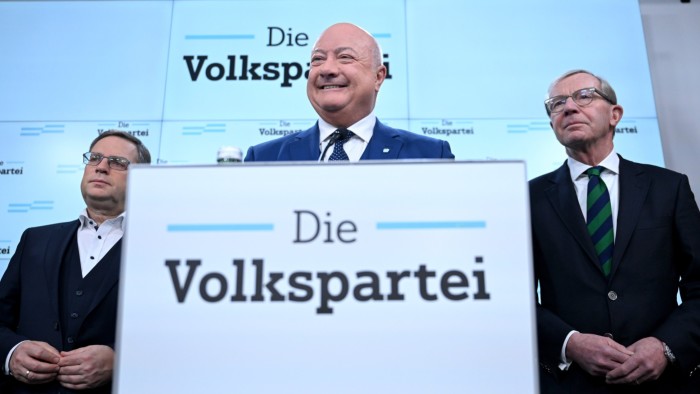Unlock the Editor’s Digest for free
Roula Khalaf, Editor of the FT, selects her favourite stories in this weekly newsletter.
The incoming leader of Austria’s centre right People’s party (ÖVP) has signalled his openness to sharing power with the far right, just a day after Chancellor Karl Nehammer resigned after failing to form a centrist governing coalition.
Christian Stocker, the ÖVP’s general secretary, said on Sunday that he had been nominated as the party’s new head and was willing to enter negotiations with the anti-immigration, pro-Russian Freedom party (FPÖ), which emerged with the most seats in Austria’s national election in September.
Stocker’s statement came after Austria’s president Alexander Van der Bellen announced that he would meet FPÖ’s leader Herbert Kickl on Monday. Observers expect Van der Bellen to ask Kickl to form a coalition government, with centrist parties having previously ruled out such an alliance.
“If we get invited [by the FPÖ to hold coalition talks], we will seriously conduct these discussions like we did in the past with the other parties,” said Stocker, stressing that his party will “face its responsibilities”.
The ÖVP would be the junior partner in any tie-up with the far-right Freedom party, which won 28.8 per cent of the votes in the September election, compared to the ÖVP’s 26.3 per cent.
It was the first time the FPÖ, which has embraced increasingly hardline policies on immigration and the war in Ukraine under Kickl in recent years, had come first in a national election.
The failed negotiations deepened the political stasis in Austria at a time when its economy is at risk of shrinking for a third successive year in 2025. Vienna also faces the prospect of finding between €18bn and €24bn in budget cuts to repair its public finances, according to figures from the EU Commission.
One possibility to break any deadlock would be fresh elections, but that could further strengthen the hand of the FPÖ. One poll for tabloid Kronen Zeitung after Nehammer’s resignation suggested FPÖ would surge to 37 per cent in a snap vote, while the ÖVP would fall to 21 per cent.
Van der Bellen last year tasked the then ÖVP leader and chancellor Nehammer to form a government. Nehammer, who had vigorously ruled out any co-operation with Kickl, resigned late on Saturday after conceding that lengthy negotiations with the Social Democrats had hit a wall.
The 52-year-old, who has served as chancellor since 2021 when his predecessor Sebastian Kurz stood down amid a corruption investigation, had sought to strike a deal to form a centrist coalition with the Social Democrats and the small, liberal Neos party.
In a brief statement to journalists in Vienna on Sunday, the designated new ÖVP boss Stocker acknowledged that he had also been highly critical of the far-right FPÖ in the campaign. But he stressed that circumstances have changed and that all attempts to form a government without the FPÖ failed.
Read the full article here













